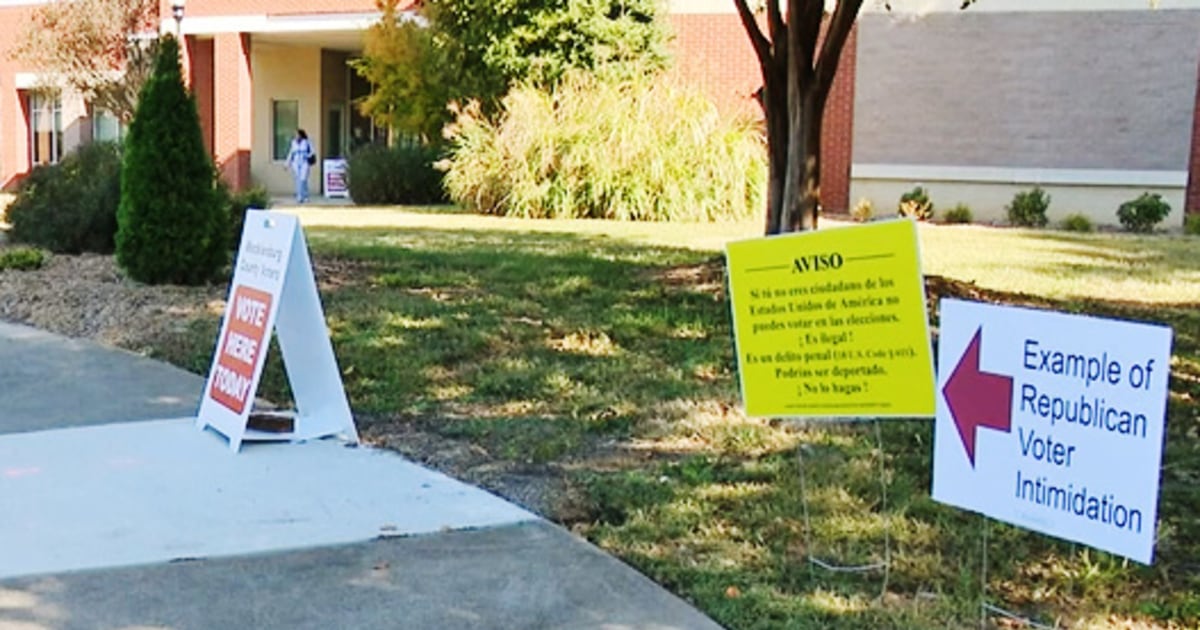During the first week of early voting in North Carolina, civil rights organizations operating voter intimidation hotlines in the state received over a dozen alarming calls from voters and residents about the proliferation of Spanish-language signs at polling sites warning noncitizens not to vote, even though it’s already illegal and rare.
More than 500 of these bright yellow signs have been posted across the state by the North Carolina Election Integrity Team, an organization affiliated to the Election Integrity Network, a coalition of conservatives “dedicated to securing the legality of every American vote.”
The Election Integrity Network is run by Cleta Mitchell, a once-liberal Democratic Oklahoma legislator who has constructed a vast conservative apparatus promoting falsehoods about noncitizen voting. Mitchell, an attorney, also played a key role in trying to overturn Donald Trump’s 2020 election loss.
In North Carolina, the signs read in Spanish, “WARNING: if you are not a citizen of the United States of America, you cannot vote in elections. It is illegal! It is a crime. 18 U.S. Code § 611. You could be deported. Don’t do it!”
Kathleen Roblez, a senior voting rights council and litigation manager at Forward Justice, a legal organization helping operate one of the voter intimidation hotlines, said they recently received a call from a poll worker in Durham County who reported seeing the sign outside her voting site and expressed concerns over possible voter intimidation of Latino voters.
As of Friday, the organization had received similar reports from people in eight counties. Earlier this week, Forward Justice addressed a letter to the North Carolina State Board of Elections, calling for the signs to be removed because they constitute “unlawful voter intimidation.”
The letter was co-signed by nearly two dozen organizations, including the North Carolina chapter of the American Civil Liberties Union.
“This is obviously not very welcoming, especially for someone who’s a new American voter” and those who are monolingual Spanish speakers or speak Spanish as their first language, said Jaclyn Maffetore, a senior staff attorney, at the ACLU in North Carolina.
While the state board of elections has not responded to the letter, it has said that they have no authority to remove the signs from polling locations because they “accurately state the law” and there’s no evidence that eligible voters are misunderstanding the signs.
But in practice, the signs are having the “practical effect of intimidating” not only people who are new to the electorate but voters in households where the immigration status of each family member varies, Maffetore said. “The signs, we feel, are unnecessary.”
It’s already illegal for noncitizens to vote in elections in North Carolina and at the federal level — and illegal voting rarely happens.
Nationwide, a study of the 2016 election conducted by the Brennan Center found that, of 23.5 million votes cast, election officials only found about 30 cases of potential noncitizen voting. Data from the public policy research organization Cato Institute and the conservative think tank The Heritage Foundation also shows that the occurrence of noncitizens illegally voting in the U.S. has been negligible in subsequent elections.
In North Carolina, a 2016 election audit from the state elections board found that illegal noncitizen voting is extremely rare, identifying 41 cases in an election where nearly 4.8 million voters participated. Last month, when state election officials removed 747,000 ineligible registration records from their voter rolls, only nine noncitizens were identified as registered voters.
These numbers seem to suggest that the signs from the North Carolina Election Integrity Team are mostly being seen by “people who are entitled to vote, are lawfully registered American citizens that are getting out to vote and just happen to speak Spanish,” Maffetore said.
A warning for voters — but only in Spanish
Jim Womack, president of the North Carolina Election Integrity Team, insisted illegal noncitizen voting is more common than it actually is, citing sporadic cases that fit a larger political strategy from Republicans to make election integrity a cornerstone of their messaging campaign.
Womack, who is also the GOP chairman in Lee County, said the bright yellow signs his groups has pasted all over the state have “nothing threatening in there,” adding they’re meant to protect noncitizens and “stop them from committing a crime.”
When responding to criticism from groups saying the signs are meant to unfairly target Latino voters in general because they are only in Spanish, Womack said the organization did not have enough funding to print the signs in multiple languages. Therefore, they prioritized getting them out in Spanish based on data from Homeland Security showing that “more than 70% of all immigrants are fluent in Spanish.”
Womack believes the signs are proving to be effective, saying he has received reports from volunteers at several polling locations “where apparent Latin voters have stopped, read the sign and departed” from the voting facility.
“We don’t know if it was because they chose not to commit a crime or if they just wanted to read the sign,” he said. When asked if this meant that Spanish-speaking Latino voters were potentially being diverted from voting, Womack responded, “I cannot confirm the veracity of the reports… I’m hopeful that it’s helping to educate and inform.”
“We’re not allowed to challenge or question or intimidate any voter,” Womack added.
Roblez and Maffetore urged voters to reach out to their respective organizations or call a hotline if they encounter any issues at polling locations and report any concerns.
Early voting in North Carolina ends on Nov. 2.

Leave a Reply